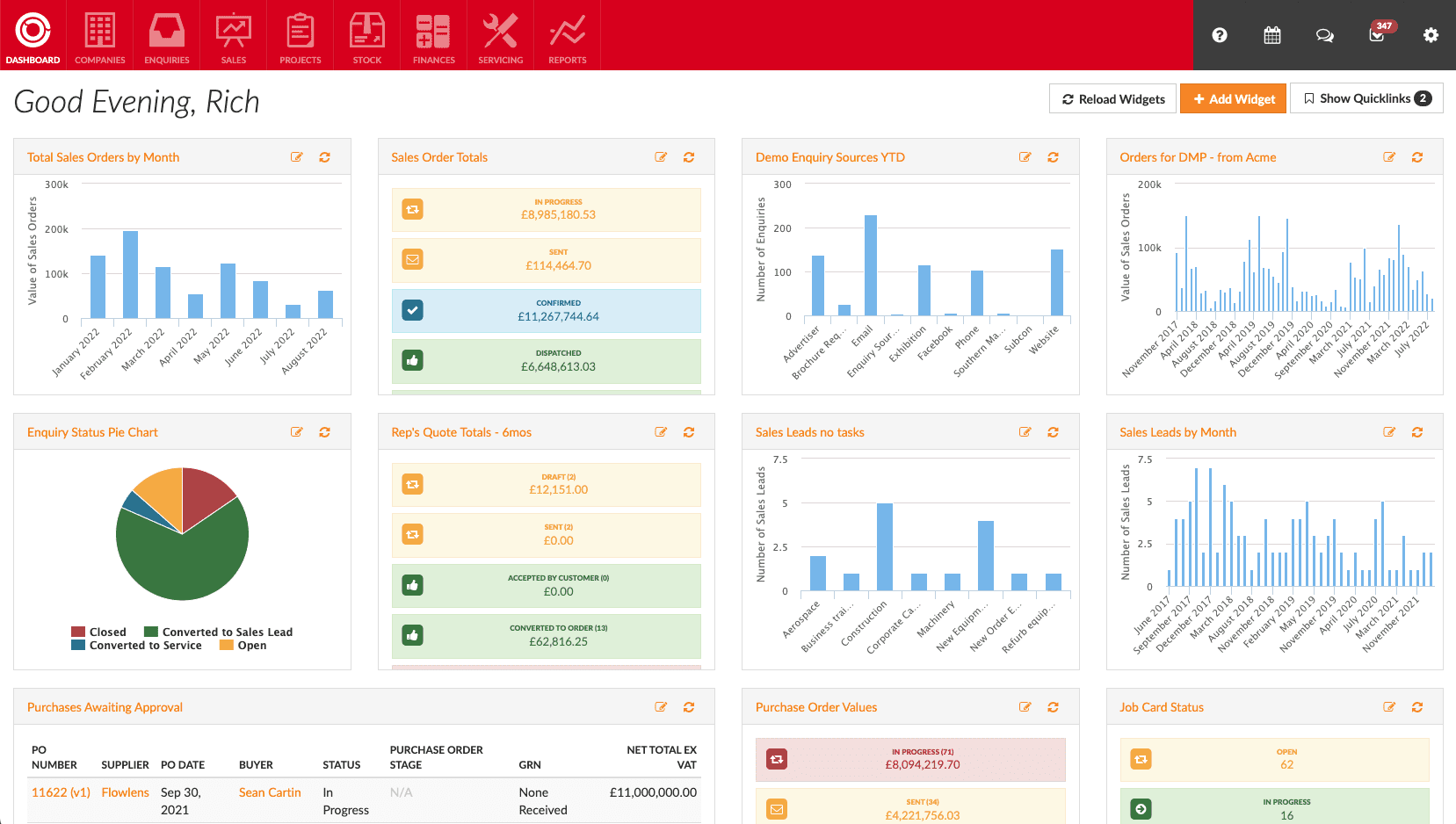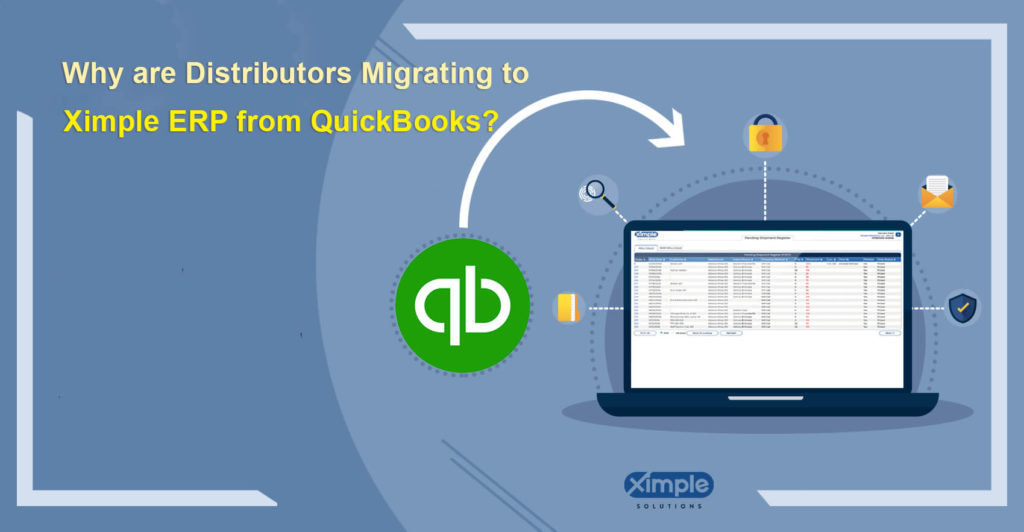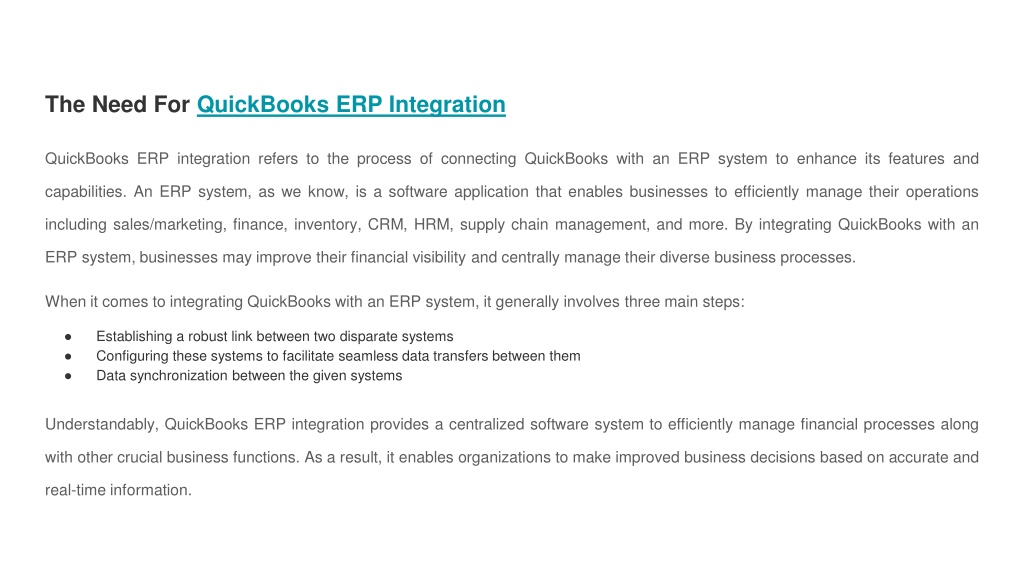QuickBooks ERP: The Ultimate Guide for Growing Businesses
QuickBooks ERP is a powerful software solution designed to help businesses of all sizes manage their finances, operations, and customer relationships. It’s a comprehensive system that integrates various business functions, making it easier for you to streamline your operations and make better business decisions. This guide will provide a detailed overview of QuickBooks ERP, its features, benefits, and how it can help your business grow.
Keyword: QuickBooks ERP, ERP software, business management software, financial management, operations management, customer relationship management, business growth, software solution, cloud-based software, accounting software, inventory management, supply chain management, project management, reporting and analytics.
Understanding the Core Functionality of QuickBooks ERP
QuickBooks ERP goes beyond basic accounting software. It offers a robust suite of tools designed to manage all aspects of your business. Let’s explore some key functionalities:
-
Financial Management: At its core, QuickBooks ERP provides comprehensive financial management capabilities. You can track your income and expenses, manage accounts payable and receivable, generate financial reports, and much more. This allows you to gain a clear understanding of your financial health and make informed decisions.
-
Operations Management: Beyond financials, QuickBooks ERP helps you optimize your operations. Features include inventory management, allowing you to track stock levels, manage orders, and prevent stockouts. Supply chain management tools help you streamline your procurement process and ensure timely delivery of goods. Project management features assist in tracking progress, managing resources, and staying on schedule.

-
Customer Relationship Management (CRM): Strong customer relationships are crucial for business success. QuickBooks ERP integrates CRM capabilities, helping you manage customer interactions, track sales opportunities, and improve customer satisfaction. You can centralize customer data, making it easier to personalize communications and provide excellent service.

Reporting and Analytics: Making sense of your data is crucial for effective decision-making. QuickBooks ERP provides a variety of reporting and analytics tools. You can create custom reports, analyze key performance indicators (KPIs), and gain valuable insights into your business performance. This data-driven approach allows you to identify areas for improvement and make strategic adjustments.
| Feature Category | Specific Features | Benefits |
|---|---|---|
| Financial Management | Accounts Payable/Receivable, General Ledger, Budgeting, Financial Reporting | Improved financial accuracy, better cash flow management, informed financial decisions |
| Operations Management | Inventory Management, Supply Chain Management, Project Management, Manufacturing | Optimized inventory levels, streamlined processes, improved efficiency |
| Customer Relationship Management (CRM) | Contact Management, Sales Pipeline Management, Customer Service Tracking | Stronger customer relationships, increased sales, improved customer satisfaction |
| Reporting & Analytics | Custom Reports, KPI Dashboards, Data Visualization | Data-driven insights, informed decision-making, improved business performance |
Choosing the Right QuickBooks ERP Solution
QuickBooks ERP offers various editions tailored to different business sizes and needs. Choosing the right edition is crucial for maximizing its benefits. Consider the following factors:
-
Business Size: The edition you select should align with the size and complexity of your business. Smaller businesses might find a simpler edition sufficient, while larger enterprises may need a more comprehensive solution.
-
Industry: QuickBooks ERP offers industry-specific solutions that cater to the unique needs of different industries. Choosing an industry-specific edition can significantly improve efficiency and accuracy.
-
Scalability: Ensure the chosen edition can scale with your business’s growth. You shouldn’t have to switch editions frequently as your business expands.
-
Integration: Consider the software your business already uses and ensure QuickBooks ERP integrates seamlessly with those systems. This avoids data silos and improves efficiency.
Benefits of Implementing QuickBooks ERP
Implementing QuickBooks ERP offers numerous benefits for your business:
-
Improved Efficiency: By automating tasks and streamlining workflows, QuickBooks ERP frees up valuable time and resources. This allows your team to focus on strategic initiatives rather than mundane tasks.
-
Enhanced Accuracy: Automating data entry and reducing manual processes minimizes errors and improves the accuracy of your financial and operational data.
-
Better Decision-Making: With access to real-time data and insightful reports, you can make more informed and strategic decisions.
-
Increased Productivity: Streamlined processes and improved efficiency translate to increased productivity across your organization.
-
Improved Collaboration: QuickBooks ERP facilitates better collaboration among different departments and teams. Centralized data ensures everyone has access to the information they need.
-
Reduced Costs: Improved efficiency, reduced errors, and better inventory management can significantly reduce operational costs.
-
Better Customer Service: Improved customer data management and streamlined processes enable you to provide better customer service.
Implementing QuickBooks ERP: A Step-by-Step Guide
Implementing QuickBooks ERP is a significant undertaking that requires careful planning and execution. Here’s a step-by-step guide:
-
Needs Assessment: Start by carefully assessing your business’s needs and requirements. Identify the key areas where QuickBooks ERP can provide the most value.
-
Software Selection: Choose the right edition of QuickBooks ERP that aligns with your business size, industry, and future growth plans.
-
Data Migration: Migrate your existing data into QuickBooks ERP. This requires careful planning and execution to ensure data integrity.
-
Training: Provide comprehensive training to your employees on how to use QuickBooks ERP effectively. This is crucial for successful implementation.
-
Testing: Thoroughly test the system before going live to identify and resolve any issues.
-
Go-Live: Once testing is complete, implement QuickBooks ERP across your organization.
-
Ongoing Support: Maintain ongoing support and maintenance to ensure the system runs smoothly and receives necessary updates.
| Implementation Stage | Key Activities | Considerations |
|---|---|---|
| Needs Assessment | Identify business needs, define goals, analyze existing systems | Involve key stakeholders, gather data from different departments |
| Software Selection | Evaluate different editions, consider features and integrations | Choose a solution that scales with your business growth |
| Data Migration | Plan data migration strategy, cleanse and prepare data | Ensure data integrity and minimize disruption |
| Training | Develop training materials, conduct training sessions | Provide ongoing support and resources |
| Testing | Conduct thorough testing, identify and fix issues | Involve users in testing to get feedback |
| Go-Live | Implement system across the organization, monitor performance | Plan for potential issues and have contingency plans |
| Ongoing Support | Maintain system updates, provide ongoing support | Regularly review system performance and make adjustments |
QuickBooks ERP vs. Other ERP Solutions
QuickBooks ERP is a strong contender in the ERP market, but it’s important to compare it to other solutions to determine the best fit for your business. Consider factors like pricing, features, scalability, and integration capabilities when making your decision. Other popular ERP solutions include SAP, Oracle NetSuite, and Microsoft Dynamics 365.
Conclusion
QuickBooks ERP is a powerful and versatile software solution that can significantly benefit growing businesses. Its comprehensive features, ease of use, and scalability make it a popular choice for organizations of all sizes. By carefully planning your implementation and providing adequate training, you can maximize the benefits of QuickBooks ERP and achieve significant improvements in efficiency, accuracy, and decision-making. Remember to choose the right edition for your specific needs and consider the long-term scalability of the solution. The investment in QuickBooks ERP can lead to substantial returns in terms of improved business performance and growth.
Frequently Asked Questions (FAQs)
-
Q: What is the cost of QuickBooks ERP? A: The cost of QuickBooks ERP varies depending on the edition and the number of users. It’s best to contact QuickBooks directly for a quote.
-
Q: Is QuickBooks ERP cloud-based? A: Yes, QuickBooks ERP is a cloud-based solution, meaning you can access it from anywhere with an internet connection.
-
Q: How long does it take to implement QuickBooks ERP? A: The implementation time varies depending on the size and complexity of your business. It can range from a few weeks to several months.
-
Q: What kind of support is available for QuickBooks ERP? A: QuickBooks offers various support options, including phone, email, and online resources.
-
Q: Can QuickBooks ERP integrate with other software? A: Yes, QuickBooks ERP integrates with many other software solutions, including CRM systems, e-commerce platforms, and other business applications.
-
Q: Is QuickBooks ERP suitable for all business types? A: While QuickBooks ERP is versatile, some very large or highly specialized businesses may require more specialized ERP solutions.
This expanded article provides a more comprehensive overview of QuickBooks ERP, addressing various aspects in a clear and accessible manner. Remember to always conduct thorough research and consult with experts to determine the best ERP solution for your specific business needs.

